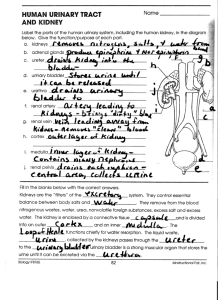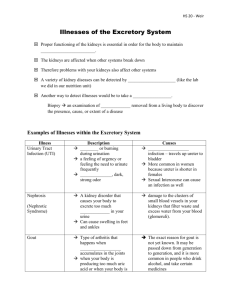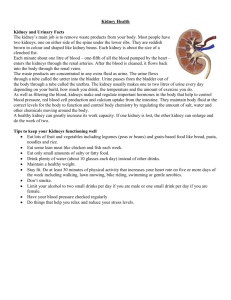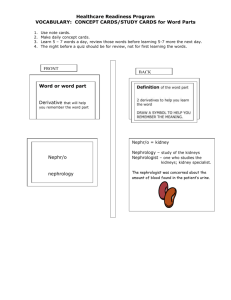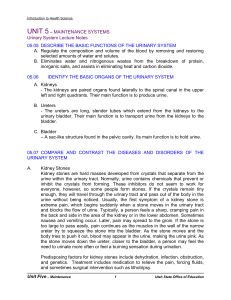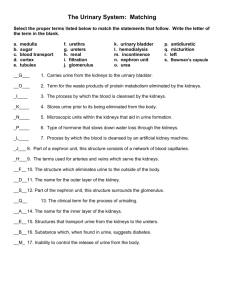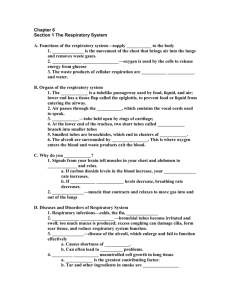The Urinary System
advertisement
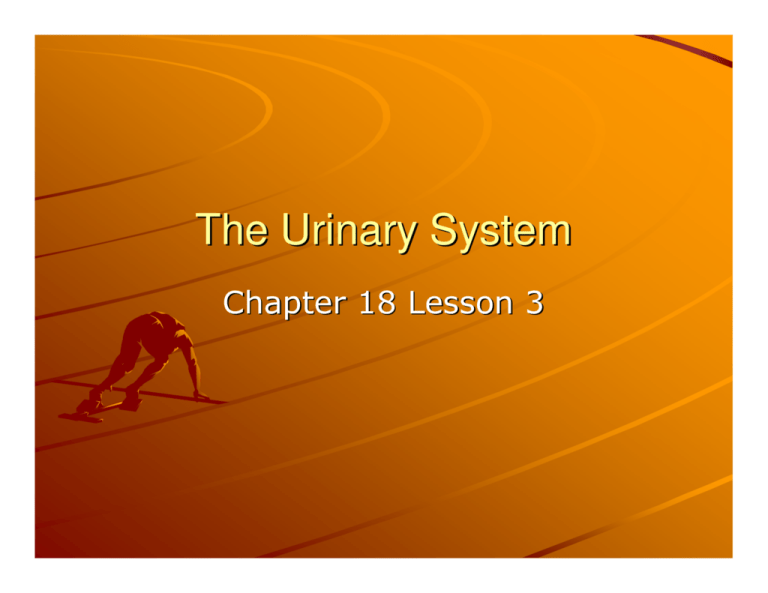
The Urinary System Chapter 18 Lesson 3 Functions of the Urinary System The chief function of the urinary system is removal of water soluble waste products that result from chemical changes to cells. This liquid waste material- urine- contains nitrogen, and therefore would become toxic if allowed to remain in your body. The urinary system consists of several organs that are linked together forming the urinary tract. These include the kidneys, the ureters, the bladder, and the urethra. The Kidneys Shaped like beans and each about the size of your fists, the kidneys are known as your body’s master chemists. Within each kidney are as many as one million highly specialized units called nephrons- the functional units of the kidney. Your kidneys filter about 50 gallons of blood each day. Your kidneys monitor and maintain your body’s acid base and water balance automatically. When you become too dehydrated, your kidneys send a signal to your brain stimulating it to get a drink. The urine that your kidneys excrete is carried along to the next step in its journey by ureters- tubes that connect the kidneys with the bladder. The Bladder and the Urethra Bladder- a hollow, muscular organ that acts as a reservoir for urine. The bladder in males is larger than that of females. The bladder can hold as much as a pint of urine. Sphincter muscles under voluntary control relax and allow urine to flow through the urethra- the tube that leads from the bladder to the outside of the body. The male urethra is much longer than the females 9 inches versus 1 ½ inches. Care of the Urinary System Waste products that are not removed from your body can be toxic to the organs and tissues. The main way to care for your urinary system is to drink plenty of fluids. Practicing good health habits will help prevent the risk of bacterial infection to the organs in your urinary system. Problems of the Urinary System Cystitis- a bacterial infection of the bladder, occurs most frequently in females. Symptoms include a burning sensation and high frequency of urination. If left untreated the infection can move to the ureter and kidneys. Urethritis- inflammation of the urethra. Usually caused by infection, the passage of urine becomes painful and difficult. Incontinence- the inability of the body to control the bladder and the elimination of waste. May occur if the sphincter muscle that closes the urethra is weakened or damages. Occurs most frequently in older adults. Kidney Problems Nephritis- an inflammation of the nephrons in the kidneys. Symptoms include high blood pressure, weakness, fatigue, and swelling. Kidney Stones- small, hard crystals formed by the substances in urine. Small stones pass easily in urine, while larger ones may need medical treatment. High-intensity sound waves are focused on the area where the stones are located allowing the stones to disintegrate. The process is painless, resulting in fragments passing out of the body in urine. Kidney Problems cont. Uremia- the presence of excess waste products in the blood. Uremia develops as a result of kidney failure. Kidney Failure Can be acute, or chronic. Kidney failure may be caused by blockage of urine, a serious case of nephritis, loss of blood, or any disease that causes damage to the kidneys. Three techniques used today to treat those who suffer from chronic kidney failure are: Hemodialysis- a technique in which an artificial kidney machine removes waste products from blood. Process takes 2-6 hours and usually is carried out 3 days per week. Kidney Failure cont. Peritoneal Dialysis involves insertion of a catheter- a tube that provides a passageway fro fluids- through an abdominal incision into the peritoneal cavity. This allows the patient to be treated at home. Kidney Transplant the diseased kidney is replaced with a healthy kidney from a donor. Kidney transplants are successful in more than 80% of cases when the donor is not related to the patient and over 90% if the donor is a blood relative.
